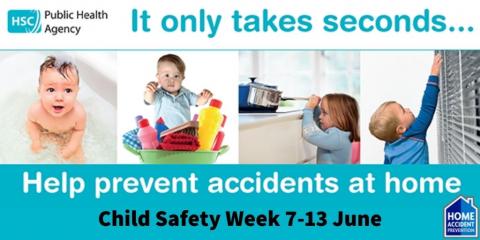Accident prevention in the spotlight during Child Safety Week

Accidents are the main cause of death for children post-infancy, with many occurring in the home. During Child Safety Week (7-13 June) the Public Health Agency (PHA) is raising awareness of accidents that can happen in the home and providing helpful tips to prevent them from occurring.
Hilary Johnston, Health and Social Wellbeing Improvement Manager with the PHA, said: "In Northern Ireland in a typical week, two people die as a result of home accidents. In addition to these deaths, there are approximately 17,000 admissions to hospital each year as a result of unintentional injuries.
”“More accidents happen in the home than anywhere else, so we are encouraging everyone to be mindful of the dangers in and around the home and look at ways to prevent accidents occurring.
“Like a lot of people across the world today, you may be spending more time at home or in your garden, and you might also have young children at home 24/7, getting bored and looking for things to do. For some of that time you may also have to do work from home that wouldn’t otherwise be done in your household environment. You may find your attention is being pulled in many different directions while trying to maintain good supervision of your little ones.
“This is why it is perhaps now more important than ever to be aware of risks around the home and to take steps to minimise these.
“Some of the most common causes of child accidents include burns from cookers and scalds from spillages, poisonings from hazardous household products, road accidents occurring during the busy home-time chaos, slipping under the water in the bath, and falls.
“Internal window blind cords and chains can also pose a risk to babies, small children and vulnerable people who could injure or even strangle themselves on looped operating cords and chains. It is important that parents, relatives and carers check their homes and proactively take steps to make sure that children are kept safe.”
Helpful tips:
- Examine every blind in your home. If they have a looped control chain or cord and do not have a safety device fitted, then you can easily install one of the many devices available;
- Ensure that all operating blind cords and chains cannot be reached by children;
- Move cots, beds and any furniture away from windows and blinds – remember children love to climb;
- Put small toys and button batteries that could cause choking or be potential fatal if swallowed out of the reach of children;
- Ensure food is cut up into small piece;
- When cleaning out kitchen cupboards and cabinets it is also important to put household cleaners and medicines away to avoid accidental poisoning or chemical burns. Make sure they are out of the sight and reach of children in a locked or high-level cupboard and clean up any spills;
- Secure any loose fitting rugs to avoid trips and falls;
- Be mindful of dangers associated with hot appliances or with hot liquids to prevent burns and scalds;
- Check that televisions, chests of drawers and shelving units are securely anchored to the wall as bulky, heavy furniture can seriously injure or even kill a small child if it falls on top of them;
- Test smoke alarms and carbon monoxide detectors;
- Always supervise children, especially when power tools and lawnmowers are being used, and tidy up all equipment straight after the job is done;
- Always supervise children when they are playing in the garden, on trampolines and climbing frames and be aware of the dangers associated with open ponds and pools.
“Children are particularly vulnerable and can suffer devastating effects as a consequence of accidents in and around the home. Children are naturally curious about their environment – they like to climb and they like to put things in their mouths to see what they taste like. It is impossible to watch over our children 24 hours a day, therefore we must take steps to make the home environment as safe as possible.
“Child Safety Week acts as a reminder to everyone to reduce the risk of preventable accidents. It needn’t be another thing to do – by incorporating small changes into your routine, accident prevention will become a habit without having to think about it. The CAPT website is packed full of tips and resources to help educate children of risks in the home and outside. For more information see www.capt.org.uk/safety-advice,” concluded Hilary.
